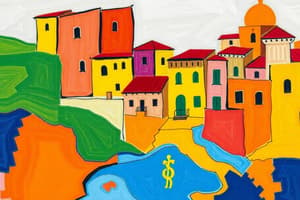Podcast
Questions and Answers
What is the State of Autonomies based on?
What is the State of Autonomies based on?
- Sovereignty of the communities
- Unity in diversity (correct)
- Willingness to accede to autonomy
- Solidarity among the communities
What is the basic institutional law of the autonomous community or city?
What is the basic institutional law of the autonomous community or city?
- Organic Law
- Statute of Autonomy (correct)
- Regional Law
- Constitution
What is the unique characteristic of the territorial structure of Spain?
What is the unique characteristic of the territorial structure of Spain?
- Fiscal federalism
- Symmetrical devolution
- Centralized government
- Asymmetrical devolution (correct)
What is the percentage of public expenditure in Spain accounted for by the autonomous communities?
What is the percentage of public expenditure in Spain accounted for by the autonomous communities?
What is the purpose of the Council on Fiscal and Financial Policy?
What is the purpose of the Council on Fiscal and Financial Policy?
What is the official language of the state in Spain?
What is the official language of the state in Spain?
What is the role of municipalities in Spain?
What is the role of municipalities in Spain?
What are the three groups of powers to be exercised in the autonomous communities?
What are the three groups of powers to be exercised in the autonomous communities?
What was the Ibarretxe Plan?
What was the Ibarretxe Plan?
Flashcards
Autonomous Communities
Autonomous Communities
First-level political and administrative divisions in Spain, created to guarantee autonomy of nationalities and regions within the limits of the Constitution.
Statutes of Autonomy
Statutes of Autonomy
Organic laws that govern autonomous communities, outlining their powers and responsibilities.
Asymmetrical Devolution
Asymmetrical Devolution
The principle that autonomous communities have different levels of devolved powers.
Chartered Regime
Chartered Regime
Signup and view all the flashcards
Council on Fiscal and Financial Policy
Council on Fiscal and Financial Policy
Signup and view all the flashcards
Official Languages in Spain
Official Languages in Spain
Signup and view all the flashcards
Provinces in Spain
Provinces in Spain
Signup and view all the flashcards
Exclusive Powers
Exclusive Powers
Signup and view all the flashcards
Executive Powers
Executive Powers
Signup and view all the flashcards
Study Notes
Autonomous communities are the first-level political and administrative division of Spain, created to guarantee limited autonomy of the nationalities and regions that make up Spain. While sovereignty is vested in the nation as a whole, the nation has devolved power to the communities, which exercise their right to self-government within the limits set forth in the Constitution and their autonomous statutes. Spain is not a federation, but a decentralised unitary country. There are 17 autonomous communities and two autonomous cities that are collectively known as "autonomies". Each community has its own set of devolved powers, and the scope of powers varies for each community. The autonomous communities are governed according to the Constitution and their own organic laws known as Statutes of Autonomy. The Constitution established an open process whereby the "nationalities and regions" could be constituted as "autonomous communities". The Constitution was rather ambiguous on how this was to take place. It does not define, detail, or impose the structure of the state. Rather than imposing, it enables a process towards a decentralized structure based on the exercise that these "nationalities and regions" would make of the right to self-government that they were granted. The Statutes of Autonomy of the Basque Country and Catalonia were sanctioned by the Spanish Parliament on 18 December 1979. After a massive rally in support of autonomy, a referendum was organized for Andalusia to attain autonomy through the strict requirements of article 151, or the "fast route". In the end, 17 autonomous communities were created. During the second half of the 1980s, the central government seemed reluctant to transfer all powers to the "slow route" communities. After the five years set up by the Constitution, all "slow route" communities demanded the maximum transfer guaranteed by the Constitution.The Autonomous Communities in Spain: Decentralization, Tensions, and Legal Powers
-
The "second autonomic pacts" of 1992 transferred new powers to many Statutes of Autonomy of the communities in Spain, with the aim of equalizing them.
-
Spain went from being one of the most centralized countries in the OECD to being one of the most decentralized, with the central government accounting for just 18% of public spending.
-
The creation of the autonomous communities was a diverse process, and further devolution or even the return of transferred powers is always a possibility.
-
Peripheral nationalism continues to play a key role in Spanish politics, with some communities demanding further devolution or secession.
-
The fiscal tensions, particularly in Catalonia, have intensified demands for further financing during the 2010s.
-
The Ibarretxe Plan was rejected by the Spanish Parliament in 2005, which aimed to give the Basque Country shared sovereignty with Spain, full independence of the judiciary, and the right to self-determination.
-
Catalonia's president requested a new "fiscal agreement" with powers of fiscal autonomy equal to those of chartered communities, but the prime minister refused. Mas dissolved the Catalan Parliament, called for new elections, and promised to conduct a referendum on independence.
-
The Catalan Parliament voted on the independence of Catalonia in 2017, but the Spanish government declared that they would use all "legal instruments" to block any such attempt.
-
The State of Autonomies is based on four principles: willingness to accede to autonomy, unity in diversity, autonomy but not sovereignty of the communities, and solidarity among them all.
-
The Statute of Autonomy is the basic institutional law of the autonomous community or city, recognized by the Spanish constitution in article 147.
-
The powers to be exercised can be divided into three groups: exclusive to the State or central government, shared powers, and devolved powers exclusive to the communities.
-
The asymmetrical devolution is a unique characteristic of the territorial structure of Spain, in that the autonomous communities have a different range of devolved powers.Overview of Autonomous Communities and Fiscal Federalism in Spain
-
The Basque Country and Navarre have a "chartered regime" that allows them to levy and collect all "contracted taxes", including income tax and corporate tax.
-
Autonomous communities account for 35% of all public expenditure in Spain, and those under the "common regime" are encouraged to build up debt.
-
The Council on Fiscal and Financial Policy is an efficient institution that coordinates public expenditures and revenue.
-
Spanish is the official language of the state, but the "other Spanish languages" can also be official in their respective communities.
-
The Statutes of Autonomy of the respective autonomous communities have declared Basque, Catalan, and Galician to be the language proper to their regions.
-
Municipalities have the right to manage their own affairs through freely elected assemblies.
-
Provinces are recognized by the constitution as groups of municipalities.
-
In those seven autonomous communities formed by a single province, the provincial councils have been replaced by the communities' institutions of government.
-
The powers of the autonomous communities are divided into "Exclusive", "Shared", and "Executive" ("partial").
-
The autonomous communities have exclusive responsibility for the administration of some policy areas but may only have executive powers as far as the policy itself is concerned.
-
Autonomous communities have varying degrees of power and institutions of government.
-
The constitution allows the creation of other territorial entities formed by groups of municipalities, such as the comarca.
Studying That Suits You
Use AI to generate personalized quizzes and flashcards to suit your learning preferences.




